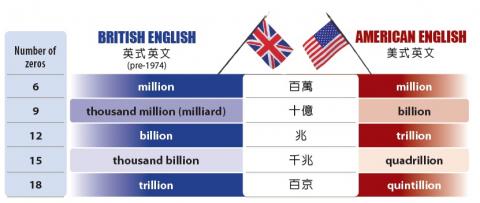In this globalized world, you would think that agreement on the definition of large numbers would be fundamental. Not so in the case of the word “billion.” Historically, in British English the word billion meant one million million; in American English it meant – and still does – one thousand million. That is, the British billion was 1,000 times larger than the American one, equal to an American trillion. For this, we can blame the French.
The word billion (or byllion), meaning a million million — the word derives from bi (two) + million — started being used in France in the 1680s and was adopted by the UK and Germany. Later, France altered the meaning to a thousand million. The two systems were distinguished by calling them the long scale (million million) and the short scale (thousand million).
Partly because of the influence of France during the American War of Independence, the US subsequently adopted the short scale. In 1948 France reverted to the long scale, back in line with the system used in the UK and Germany. However, in 1974, due to the rising importance of the US in the world economy, and the obvious danger of having different interpretations of an increasingly useful measure of large numbers, the UK government decided to fall in line with the US. In the UK, we now follow the short scale system used in the US.

(Paul Cooper, Taipei Times)
在這全球化的世界中,你會認為對大的數目有個統一的名稱是很基本的事。但「billion」一字卻非如此。在過去,英式英文裡的「billion」意為「一兆」(十的十二次方,或一百萬個一百萬);而在美式英文中,從以前到現在「billion」都是指「十億」(一千個百萬)。也就是說,英式「billion」比美式「billion」要多一千倍,這數字相當於美式英文的「trillion」一字。之所以如此,都要怪法國人。
「billion」(或byllion)這個字,意思是「一兆」(一百萬個一百萬),此字源於「bi」(意為「二」),再加上「million」(百萬);「billion」一字在一六八○年代開始在法國使用,並被英國和德國採用。後來,法國把「billion」一字的意思改為「十億」。這兩種系統分別稱為長級差制(一兆)和短級差制(十億)。

Photo: Wikimedia Commons
照片:維基共享資源
美國後來採用了短級差制,部分原因是美國獨立戰爭期間所受法國的影響。一九四八年,法國恢復了長級差制,而與英國及德國的系統一致。然而,由於美國在世界經濟中的重要性越來越高,以及對日益常用的大數目有不同詮釋的明顯危險,英國政府在一九七四年決定和美國的用法統一。因此現今英國是遵循美國所採用的短級差制,「billion」一字在英式英文和美式英文中,意思都是「十億」。
(台北時報林俐凱譯)

Have you ever wondered why “Manila envelopes” carry that name? The answer lies in a plant native to the Philippines. Though a fruit-producing plant, abaca is most valued for its leaf stalks, which are __1__ to extract fibers known as “Manila hemp.” These fibers are known for their strength and resistance to saltwater. Because of its __2__ in sea environments, Manila hemp has long been used to make Manila rope, a staple in the sailing and maritime industries for centuries. It withstands harsh ocean conditions without its flexibility being __3__. Manila rope doesn’t break down easily when exposed to

A: In addition to boyband Energy’s concerts, Taiwan’s first major male dance revue has attracted attention. B: Several South Korean male dance revues and Australia’s Thunder from Down Under often tour Taiwan. Now Taiwan’s first all-male revue has finally appeared. A: According to the Liberty Times, Muscle High: A Male Dance Revue from Taiwan, featuring 13 hunks, opened last month and will run until Sept. 14. B: The rise of “hunk fever” in recent years has even caused a trend of working out in Asia. A: Let’s go to the Taipei Music Center’s Sub Livehouse for the show. A:

A: Any fun events happening this weekend? B: Boyband Energy’s concerts and Taiwan’s first major male dance revue have both sparked anticipation recently. A: Energy staged a comeback last year — 15 years after they disbanded — and they’re now more popular than ever. B: Their megahit “Friday Night” even won Song of the Year at the Golden Melody Awards. A: To pay tribute to the Queen of Pop Madonna, they added her choreography of 16 continuous jump squats to their music video, prompting a “16-squat challenge” that went viral across Taiwan. Do you wanna try it out? A:

In a major step to combat carbon emissions, Norway’s pioneering “Northern Lights project” is set to expand its carbon capture and storage (CCS) capabilities. Backed by energy giants and the Norwegian government, this collaborative project is working to increase its annual carbon storage capacity from 1.5 million to over five million tons. Northern Lights focuses on capturing CO2 emissions from industrial sources across Europe and securely storing them underground. Captured CO2 will be liquefied and transported by ship to the storage facility located off the coast of Norway. It will be injected through pipes into geological formations about 2,600m below the